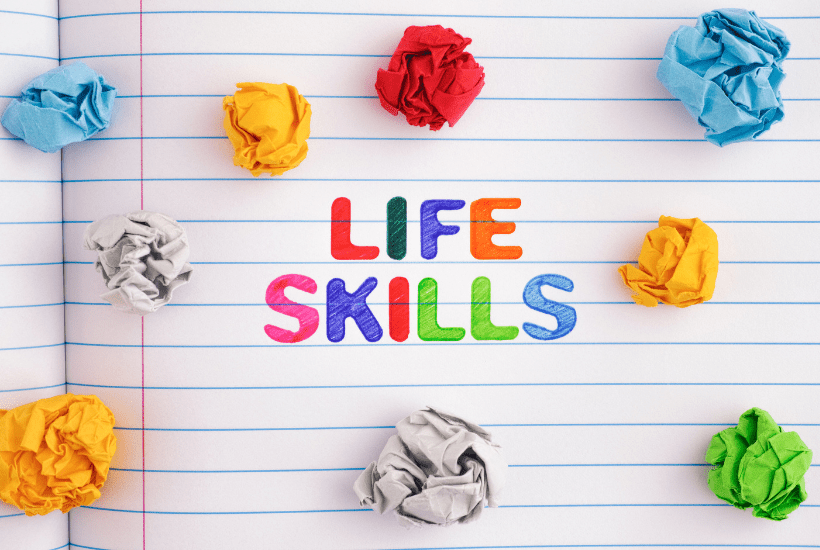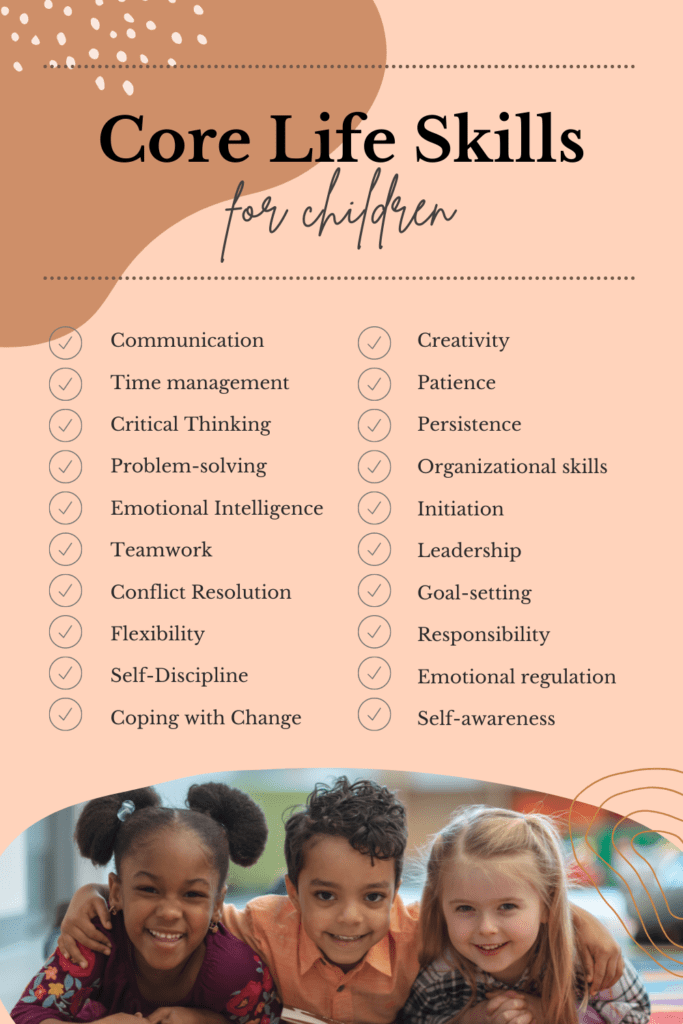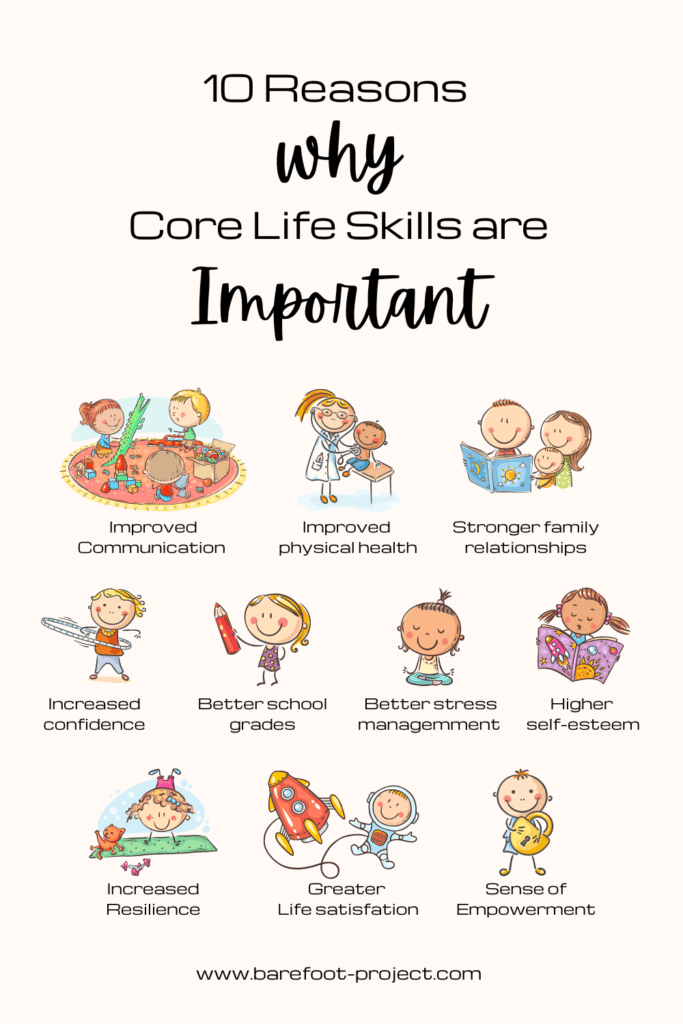Why Core Life Skills Are Important?
Countless core life skill strategies and techniques can help you live a better life. But, as a parent, you are responsible for ensuring that your children learn these skills and put them into practice daily.
Children nowadays grow up in a world drastically different from the one their parents grew up in.
With technology becoming increasingly prevalent in society, children need to learn how to use it responsibly and effectively.
All youth need to develop a set of core life skills to manage school, work, outside interests, and social relationships successfully. From the perspective of brain development, these skills include planning, focus, self-control, awareness, and flexibility—also known as “executive function” and “self-regulation” skills.
Harvard University
I believe that parents can help their children develop strong life skills.
When you instill these values in your children at a young age, they will be more likely to grow into responsible and successful adults. And it helps them stay rooted and focused in an ever-changing world.

What are core life skills, and why are they important?
Core life skills are the abilities that enable us to deal with the challenges and opportunities of everyday life effectively. They help us cope with work, relationships, and family demands.
Some examples of core life skills include time management, communication, critical thinking, problem-solving, and emotional intelligence.
These skills are important because they enable us to navigate life’s challenges and opportunities productively and positively.
For children, developing core life skills is essential for their success in the future. Children with strong life skills are more likely to do well in school, have healthier relationships, and be successful in their careers.

20 Core Life skills:
- Communication
- Time management
- Critical thinking
- Problem-solving
- Emotional intelligence
- Self-awareness
- Teamwork
- Conflict resolution
- Flexibility
- Creativity
- Patience
- Persistence
- Organizational skills
- Initiative
- Leadership
- Goal-setting
- Responsibility
- Self-discipline
- Emotional regulation
- Coping with change

How can parents help their children develop these skills?
As a parent, you can help your child develop strong life skills by modeling these behaviors yourself and providing opportunities for your child to practice them.
Here are some tips for teaching core life skills to children:
1. Communication:
Talk to your children about what you are doing and why it is important. Explain things in a way that they can understand. Encourage your children to ask questions and express their own ideas.
2. Time management:
Help your children learn to use their time wisely by teaching them how to plan and budget their time. Set a good example by being punctual and using your time wisely yourself.
3. Critical thinking:
Help your children learn to think critically by teaching them how to ask questions and consider different points of view. Encourage them to use their imagination and be creative.
4. Problem-solving:
Help your children learn to solve problems by teaching them how to identify the problem, brainstorm solutions, and choose the best solution. Encourage them to persevere and not give up when they face a challenge.
5. Emotional intelligence:
Help your children understand and manage their emotions by teaching them how to identify their emotions, appropriately express their feelings, and cope with difficult emotions. Encourage them to be empathetic and considerate of others’ feelings.
6. Self-awareness:
Help your children develop self-awareness by teaching them how to recognize their strengths and weaknesses. Encourage them to set goals and strive to improve themselves.
7. Teamwork:
Help your children learn to work effectively in a team by teaching them how to communicate, cooperate, and compromise. Encourage them to be respectful of others and appreciate the value of diversity.
8. Conflict resolution:
Help your children learn to resolve conflicts peacefully by teaching them how to listen, negotiate, and compromise. Encourage them to be assertive and stand up for what they believe in.
9. Flexibility:
Help your children learn to be flexible by teaching them how to adapt to change and be open-minded. Encourage them to try new things and not be afraid of making mistakes.
10. Creativity:
Help your children learn to be creative by teaching them how to use their imagination and think outside the box. Encourage them to express themselves in different ways and take risks.
11. Patience:
Help your children learn to be patient by teaching them how to delay gratification and manage their expectations. Encourage them to persevere when they face challenges and not give up easily.
12. Persistence:
Help your children learn to be persistent by teaching them how to set goals and follow through with their commitments. Encourage them to never give up on their dreams and pursue their passions.
13. Organizational skills:
Help your children learn to be organized by teaching them how to manage their time, set priorities, and keep track of their belongings. Encourage them to be neat and tidy and create a system that works for them.
14. Initiative:
Help your children learn to take initiative by teaching them how to be proactive and take action. Encourage them not to be afraid of taking risks and seize opportunities when they arise.
15. Leadership:
Help your children learn to be leaders by teaching them to be confident, take initiative, and inspire others. Encourage them to be role models for their peers and make a positive difference in the world.
16. Goal-setting:
Help your children learn to set goals by teaching them how to create a plan and take action. Encourage them to dream big and think outside the box.
17. Responsibility:
Help your children learn to be responsible by teaching them how to be accountable for their actions. Encourage them to make good decisions and take ownership of their lives.
18. Self-discipline:
Help your children learn to be self-disciplined by teaching them how to delay gratification, manage their time, and stay on task. Encourage them to set goals and stick to their commitments.
19. Emotional regulation:
Help your children learn to manage stress by teaching them how to identify their triggers, cope with difficult emotions, and take care of their physical health. Encourage them to find healthy outlets for their stress and not allow it to control their lives.
20. Coping with change:
Help your children learn how to cope with change by teaching them how to be flexible, adaptable, and open-minded. Encourage them to try new things and not be afraid of making mistakes.

What benefits will children reap from learning core life skills?
10 Benefits children will reap by learning core life skills
- Improved communication and social skills
- Better grades in school
- Stronger relationships with family and friends
- Increased confidence
- Higher self-esteem
- Better coping skills in times of stress
- Improved physical health
- Increased resilience
- Greater life satisfaction
- A sense of empowerment and control over their lives.

How can you ensure that your child is learning these essential skills?
Here are some tips:
1. Talk to your child’s teacher. Find out what core life skills are being taught in the classroom and how you can reinforce these concepts at home.
2. Get involved in your child’s extracurricular activities. This is a great way to help them practice and develop their core life skills.
3. Encourage your child to try new things. Stepping outside of their comfort zone will help them develop confidence and resilience.
4. Help them find a role model. Whether it’s a family member, friend, or celebrity, finding someone who exemplifies the core life skills you want your child to learn can be very helpful.
5. Teach them by example. The best way for children to learn is by seeing the concepts in action. Model the core life skills you want your child to learn; they will be more likely to adopt these habits themselves.
6. Be patient. Learning core life skills takes time and practice. So don’t get discouraged if your child doesn’t seem to be progressing as quickly as you would like. Instead, just keep leading by example and supporting their efforts, and they will eventually get there.

Are there any other important life skills that parents should be teaching their children?
If there is one skill I would add to this list, it would be to teach your child to know their own strengths.
We all have unique gifts and talents, and children need to know what theirs are. In addition, this will help them build confidence and feel good about themselves.
It will also help them find their place in life and pursue their passions.
In conclusion,
So, there you have it! These are just a few of the many core life skills that children need to learn to succeed.
As a parent, you play a vital role in teaching these skills to your child. Just remember to lead by example, be patient, and have faith in your child’s ability to learn and grow.
With your help, you can teach your child 15 skills by the age of 10.
By teaching your children those core life skills, your children will develop into well-rounded adults who are capable of achieving great things.
Thanks for reading!







